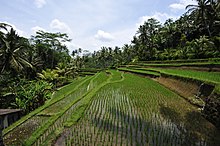Gunung Kawi


Gunung Kawi is an 11th-century temple and funerary complex in Tampaksiring[1]: 180 north east of Ubud in Bali, Indonesia.,[2] that is spread across either side of the Pakerisan river. It comprises 10 rock-cut candi (shrines) that are carved into some 7-metre-high (23 ft) sheltered niches of the sheer cliff face. These funeral monuments are thought to be dedicated to King Anak Wungsu of the Udayana dynasty and his favourite queens. On the east side there are five temples that are dedicated, according to one theory, to King Udayana, his queen Mahendradatta, and their sons Airlanga, Anak Wungsu, and Marakata. The temples on the west side are dedicated, according to the same theory, to the king's minor queens or concubines.
Inscription: on the north shrine (east side) a legible inscription reads: "Haji Lumahing Jalu," meaning "the king made a temple here."
References
- ^ Cœdès, George (1968). The Indianized states of Southeast Asia. University of Hawaii Press. ISBN 9780824803681.
- ^ wonderfulbali.com. "Tampaksiring, Valley of the Kings - Gunung Kawi". Retrieved 2007-12-20.
External links
 Central Bali travel guide from Wikivoyage
Central Bali travel guide from Wikivoyage
8°25′24.19″S 115°18′44.40″E / 8.4233861°S 115.3123333°E
